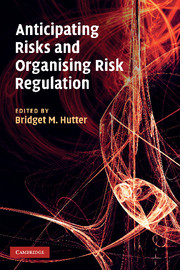Book contents
- Frontmatter
- Contents
- Contributors
- Preface
- Part I Introduction
- Part II Threat, vulnerabilities and insecurities
- 2 Risk society and financial risk
- 3 Before the sky falls down: a ‘constitutional dialogue’ over the depletion of internet addresses
- 4 Changing attitudes to risk? Managing myxomatosis in twentieth-century Britain
- 5 Public perceptions of risk and ‘compensation culture’ in the UK
- 6 Colonised by risk – the emergence of academic risks in British higher education
- Part III Social, organisational and regulatory sources of resilience and security
- References
- Author index
- Subject index
3 - Before the sky falls down: a ‘constitutional dialogue’ over the depletion of internet addresses
Published online by Cambridge University Press: 10 November 2010
- Frontmatter
- Contents
- Contributors
- Preface
- Part I Introduction
- Part II Threat, vulnerabilities and insecurities
- 2 Risk society and financial risk
- 3 Before the sky falls down: a ‘constitutional dialogue’ over the depletion of internet addresses
- 4 Changing attitudes to risk? Managing myxomatosis in twentieth-century Britain
- 5 Public perceptions of risk and ‘compensation culture’ in the UK
- 6 Colonised by risk – the emergence of academic risks in British higher education
- Part III Social, organisational and regulatory sources of resilience and security
- References
- Author index
- Subject index
Summary
Introduction: the definition of risks as contested terrain
Although it has not yet attracted much public attention, the Internet is at risk of running out of addresses. The depletion of the Internet's address space may seriously hamper the future growth and innovativeness of the Internet (OECD 2008). The potential effects of the upcoming scarcity have been likened to those of ‘the gasoline shortages of the 1970s to the industrial economy’ (Mueller 2008). According to current calculations, the pool of unallocated internet addresses could dry out as soon as in spring 2012. Anticipating the imminent shortage, the first signs of private trading activities have already been observed. In June 2008, for example, a block of 256 internet addresses was offered for sale on eBay, an electronic trading platform. This episode was presented a few months later at a meeting of internet address experts as evidence of the suspected emergence of a black market for internet addresses. The concern over a black market is part of a broader crisis scenario, which links the upcoming depletion of internet addresses to the uncertain future of industry self-regulation in this area. As some experts fear, the authority to manage this common pool resource on behalf of all internet users may vanish as well once the reservoir of unallocated addresses is dried out. The attempt to auction off an address block, a clear breach of current rules which preclude the selling of address space, could indeed indicate the dwindling authority of consensual address management on the Internet.
- Type
- Chapter
- Information
- Anticipating Risks and Organising Risk Regulation , pp. 46 - 67Publisher: Cambridge University PressPrint publication year: 2010



